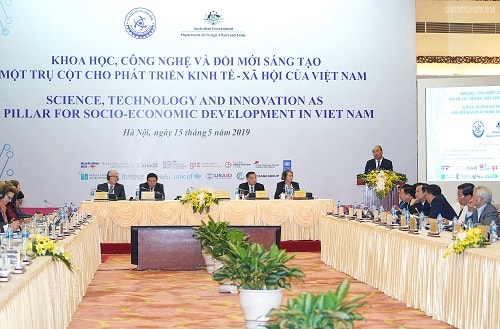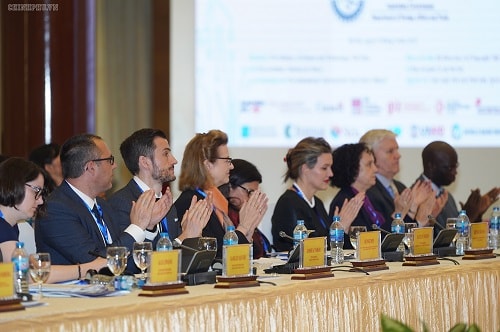Prime Minister Nguyen Xuan Phuc: Creativity is the most valuable resource, the more it is exploited, the more it flourishes.
Reality has shown that many countries are rich in resources but cannot grow quickly and sustainably, while on the contrary, there are countries with very few resources but still achieve high economic growth. So what is the secret? The Prime Minister pointed out that the important factors that make the difference are people and technology.
|
| Prime Minister Nguyen Xuan Phuc speaks at the Conference. Photo: VGP/Quang Hieu |
According to the Prime Minister, neoclassical growth models emphasize the role of capital accumulation and labor in growth. In the periods, humans mainly exploited natural resources to create growth and serve people.
However, natural resources are always limited and humanity is facing a serious scarcity of resources. If we continue to rely on that finite resource, growth will soon be exhausted and growth will reach a standstill.
Reality has shown that many countries are rich in resources but cannot grow quickly and sustainably, while on the contrary, there are countries with very few resources but still achieve high economic growth. So what is the secret? The Prime Minister pointed out that the important factors that make the difference are people and technology.
Humans are the center of creation
Prime Minister Nguyen Xuan Phuc emphasized that Vietnam has an endless resource of gray matter, human creativity, and the potential within each of us. "If natural resources are depleted the more they are exploited, the more human creative resources will flourish. In a business or any organization, not machinery or equipment, not raw materials, but human creativity is the most valuable capital" - the Prime Minister stated.
However, the Prime Minister stated that we must look directly at reality to see that Vietnam's science, technology and innovation development still has many limitations and shortcomings.
|
| Photo: VGP/Quang Hieu |
Scientific, technological and innovation capacity is still limited and the national innovation system is young and fragmented. There are still few innovation activities and R&D capacity in the business sector. The number of enterprises pursuing innovation strategies is still modest. Universities are more inclined towards training than research, and if there is research, its applicability is not high. There are not really good policies, good mechanisms or good, appropriate problems to stimulate creativity and dedication of a large number of scientists and experts.
In both the State and private sectors, Vietnam's current spending on science and technology is only about 0.44% of GDP, quite low compared to the world average of 2.23% of GDP (Thailand 0.78%; Singapore 2.2%; Malaysia 1.3%, China 2.1%). The Prime Minister pointed out that if we do not boldly invest in science, technology and innovation, we will be stuck in our own low productivity, low added value and middle income trap. Therefore, both the State and the private sector need to properly recognize the importance of investing in science and technology and prioritize spending on science and technology in a more proportionate and effective manner. Focus on practicality and efficiency, not following trends, causing waste and low application.
According to the Prime Minister, businesses also need to understand that investing in research and development is the "shortest" way to achieve efficiency, increase competitiveness and develop more sustainably.
In the coming time, Vietnam needs to have a strategic shift to promote research and development of creative startups, combined with application and technology development in a number of new industries and fields with strengths.
|
| Photo: VGP/Quang Hieu |
The Prime Minister requested that sectors and localities need to raise awareness and responsibility in directing the development of science and technology, continue to improve the legal framework and policy mechanisms. Focus on perfecting the national innovation system with enterprises at the center, closely linking research institutes, universities with enterprises to create and accumulate intellectual property, creating new fuel for rapid, inclusive and sustainable economic growth.
The Prime Minister requested the Ministry of Science and Technology to coordinate with relevant ministries, branches and organizations to advise the Government on a number of major issues such as proposing policies to encourage and promote innovation in the business sector, considering businesses as the center of the innovation system, and promoting the connection of innovation networks at home and abroad.
It is necessary to focus on developing national products based on new and high technology to form new industries and new products with high added value, especially in areas where Vietnam has strengths such as agriculture, manufacturing and processing industry, information technology...
It is necessary to study the establishment of a national data bank on science, technology and innovation.
Develop policies to attract and collaborate with talented experts at home and abroad, especially the Vietnamese scientific community abroad. Pay special attention to proposing solutions that do not follow a standard. If we want to promote innovation, the policies and mechanisms themselves must be open, flexible and creative.
Apply the public-private partnership (PPP) model to encourage businesses to participate more in innovation activities. Test the model of "State ownership, private operation". Shift from the model of using the state budget to co-financing, moving towards financial autonomy, the State places orders on research facilities, science and technology facilities and innovation and creativity.
At the Conference, delegates from international organizations said that Vietnam has had certain successes in innovation. These are useful tools to support Vietnam's development in recent times.
|
| Photo: VGP/Quang Hieu |





